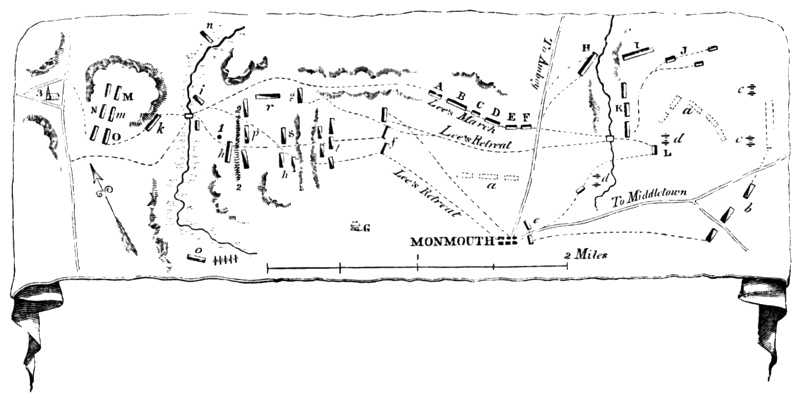After Monmouth
In this day and age, I'm not sure every schoolchild knows about the Battle of Monmouth (1778). Many, apparently, don't even know that our nation won its independence from England. I have to admit, despite a passing interest in the subject, that I'd never heard of it either, until it was mentioned on a History Channel documentary today.
That war was full of forgotten battles. I would wager that most educated Americans couldn't name more than a few of the key engagements - Lexington and Concord of course, and Bunker Hill...perhaps Princeton or Saratoga. It is a shame that so many of the others have been totally forgotten, notably the disaster at Long Island (also one of the largest battles of the war), Daniel Morgan's momentum-changing ass-whipping of the British at Cowpens (the road from there went to Yorktown), and the Battle of the Chesapeake (which finally forced Cornwallis' surrender).
The Battle of Monmouth, fought near Camden, New Jersey, is in the same category (a good pre-Civil War narrative of the battle is here).

It was:
- The first major engagement after Valley Forge
- The largest battle of the entire war (11,000 Americans against 15,000 British troops)
- The first battle in which the rebel army was made up primarily of Continental regulars
- One of the few battles in which the Americans did not retreat afterward
- The last battle between the main armies of the antagonists and the last major battle in the Northern states
I suppose the battle is forgotten because it led nowhere - even John Ferling's encyclopedic (and outstanding) Almost a Miracle gives it barely five pages. Ferling says "Monmouth was not a pivotal engagement...neither side gained anything..." Lafayette, in a letter, first called it a battle but corrected himself and instead termed it an "affair."
It is true that the Battle of Monmouth had little impact on the military situation of the time. The British were retreating and continued to retreat. The Americans were unable to inflict a significant defeat on the British, or capture any of their baggage. From a military perspective, the British achieved their goal of an orderly withdrawal from Philadelphia.
But, the more I look at it, the more I that think this was a greater moment than historians have allowed. It was the first time the Continental Army showed it could stand face-to-face, on European terms, against the best British forces in North America. And it gave the lie to the British claim that the Americans were a rabble - if they can't fight properly, why are you retreating?
Perhaps not coincidentally, it was also Washington's last major engagement before Yorktown. In this battle, like most of his others, Washington fought against larger and better-trained enemy forces. Ferling points out that until Yorktown, "in eleven years, and two wars, no enemy army had ever formally surrendered to him."
And then Washington did something unprecedented, that made our country possible:
Many people encouraged Washington to take over as dictator or king. Here, in full, is a letter Washington wrote to one such supplicant (source):
Sir - with a mixture of great surprise and astonishment I have read with attention the sentiments you have submitted to my perusal. Be assured, Sir, no occurrence in the course of the War, has given me more painful sensations than your information of there being such ideas existing in the Army as you have expressed, and I must view them with abhorrence and reprehend with severity. For the present, the communication of them will rest in my own bosom, unless some further agitation of the matter, shall make a disclosure necessary.
I am much at a loss to conceive what part of my conduct could have given encouragement to an address, which to me seems big with the greatest mischiefs that can befall my Country. If I am not deceived in the knowledge of myself, you could not have found a person to whom your schemes are more disagreeable; at the same time, in justice to my own feelings I must add that no Man possesses a more sincere wish to see complete justice done to the Army than I do, and as far as all my powers and influence in a constitutional way extend, they shall be employed to the utmost of my abilities to effect it, should there be any occasion. Let me conjure you then, if you have any regard for your Country, concern for yourself or posterity, or respect for me, to banish these thoughts from Your Mind, and never communicate, as from yourself or anyone else, a sentiment of the like Nature.
Happy 4th of July!


1 Comments:
To walk away from power at this moment was among the greatest of all political acts in history. It is the recognition of the essential equality of human beings, although it is in itself the indelible mark of Washington's will and deepest qualities.
Post a Comment
<< Home